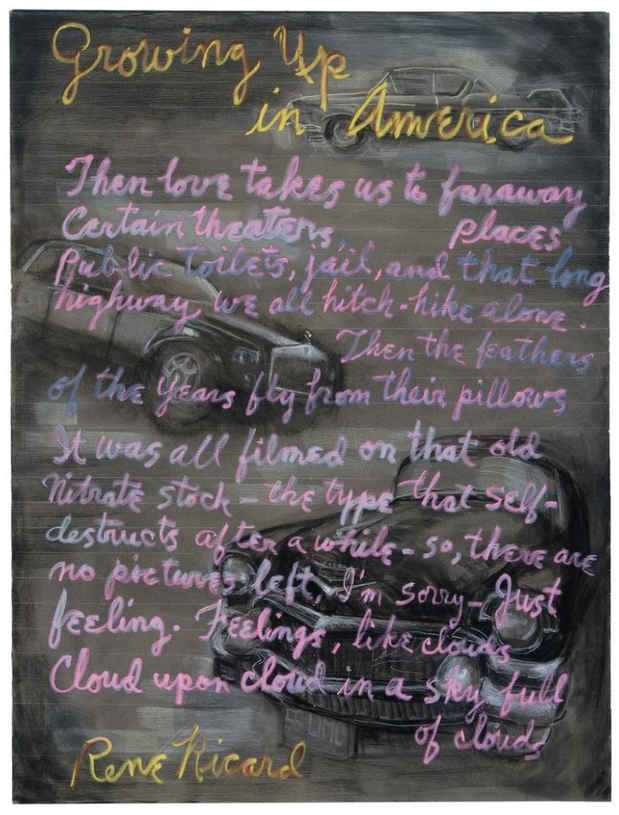Rene Ricard “Growing Up in America”
Vito Schnabel Gallery

This event has ended.
Vito Schnabel Gallery presents Rene Ricard: Growing Up in America, an exhibition of works by the American poet and painter. Ricard was an astute literary visionary and notoriously controversial arbiter of taste who established himself in the 1980s as a grandiose flâneur and illustrious acolyte of the New York art world’s downtown scene.
Opening November 12, 2021, Rene Ricard: Growing Up in America will feature of a selection of paintings on canvas, paper, and found objects dating from the late 1980s to 2012. The exhibition is a prelude to a retrospective of the artist’s work scheduled to take place at Vito Schnabel Gallery in 2023.
Rene Ricard was an important voice in the cultural discourse of his era, and his words still carry the authority of his role as witness, critic and observer to a pivotal moment in American culture. His fevered imagination, fierce wit and intellectual acumen, along with his famed bon vivant demeanor and talent for conversation, flow through the stream-of-consciousness prose central to his art. Having moved to New York in the early 1960s at the age of eighteen, Ricard quickly absorbed himself into the transgressive experimental ventures and celebrated debauchery of Andy Warhol’s glittering, silver foiled Factory. By the early 1980s, Ricard had cemented his reputation as a poet and achieved status in the art world, asking the question “What is it that makes something look like art?” in his breakthrough 1981 Artforum essay The Radiant Child, which catapulted Jean-Michel Basquiat’s rise to prominence. This influential text is considered a seminal piece of twentieth century art criticism. Similarly, Ricard’s editorials for Artfoum during the 1980s helped to advance the careers of such artists as Keith Haring, Brice Marden, Julian Schnabel and Francesco Clemente.
Assimilating imagery and text onto almost any surface of his choosing, Ricard began to develop his poems into paintings in the late 1980s. These ‘poem paintings’ employed antique prints and found paintings that Ricard had often thrifted in secondhand stores. In some cases, Ricard would paint over the original surfaces entirely, wiping out the pre-existing images. Ricard also painted his own canvases, depicting figures from old photographs and other sources. Mixing pigments and oils, he created sultry, subdued and seductive colored paintings that were lurid and ghastly, articulated in a gestural palette of smoky black, chalky grey, fiery red, or his lauded acidic ‘poison green.’ Fellow art critic Robert Pincus-Witten attributed Ricard’s ‘poem paintings’ to a strategy rooted in early modernism, connecting him to a lineage that included the calligrams of Guillaume Apollinaire and the picture poems of the Surrealists.
In a loopy, cursive script, Ricard rendered lines of poetry, stark aphorisms, and terse epigrams that evince his Wildean wit. Against the dark surface of one canvas, a seated classical nude is overpainted with bronze. Below her statuesque body, Ricard has cunningly added his dictum: “what every young sissy should know: high heels are fun, but in the long run they can hurt.” On another bright green canvas, he has painted a sparkling diamond ring, over which a silver text declares, “sometimes it’s OK to throw rocks at girls.”
Words escape Ricard in two small devotional images on view in the exhibition. In one portrait of a young boy, the artist has recast the sitter with a golden halo and a lit cigarette. The youthful adolescent meets the viewer’s gaze while exhaling a puff of white smoke. In another portrait, a found lithograph attributed to ‘MARY AT THE FOOT OF THE CROSS,’ Ricard embellishes the devout Madonna with ethereal wisps of swirling blue tobacco vapor.
Over the years, Vito Schnabel worked closely with Rene Ricard, presenting three solo exhibitions of the artist’s paintings during his lifetime and one posthumous memorial exhibition: What Every Young Sissy Should Know, Scream Gallery, London (2008); Sonnets From the Portuguese, New York (2011); Go Mae West, Young Man, Los Angeles (2012); Rene Ricard: Paintings, New York (2015).
About the Artist
Rene Ricard (1946-2014) was born in Boston, MA. He grew up in Acushnet, MA, but left his hometown as a teenager to become part of Boston’s 1960s literary scene. He moved to New York in the early 1960s and met Andy Warhol in 1964. As part of The Factory, Ricard appeared in such classic Warhol films as Kitchen (1965) and Chelsea Girls (1966), as well as films by many other independent young directors. Ricard was also a founding participant in the Theatre of the Ridiculous, along with John Vaccaro and Charles Ludlam.
Ricard’s poetry was published in journals such as the Paris Review. In 1979, Dia Art Foundation inaugurated its publishing arm with Rene Ricard 1979 -1980. The fact that this turquoise-covered book of poems appears in photographs taken on the beach in Nan Goldin’s The Ballad of Sexual Dependency illustrates its ubiquity as summer reading in the eighties. In 1989, Ricard contributed poems to Francesco Clemente: Sixteen Pastels, which was published by Anthony d’Offay. Ricard’s collection of poems includes God with Revolver (1990); Trusty Sarcophagus Co. (1990); and Love Poems (1999). In 2003, a full color monograph of Ricard’s paintings and drawings, spanning a twenty-year period of his career, was published by Perceval Press. Ricard held solo exhibitions at Petersburg Press, New York (1990); The Chelsea Hotel, New York (2002); Cheim and Read, New York (2003); Dinter Fine Art, Hudson, NY (2004); Scream Gallery, London (2008); Half Gallery, New York (2009, 2014, 2017, 2019); and Vito Schnabel Gallery, New York/Los Angeles (2008, 2011, 2012, 2015).
Ricard lived and worked in New York, where he was a long-time resident of the Chelsea Hotel.
Media
Schedule
from November 13, 2021 to December 18, 2021